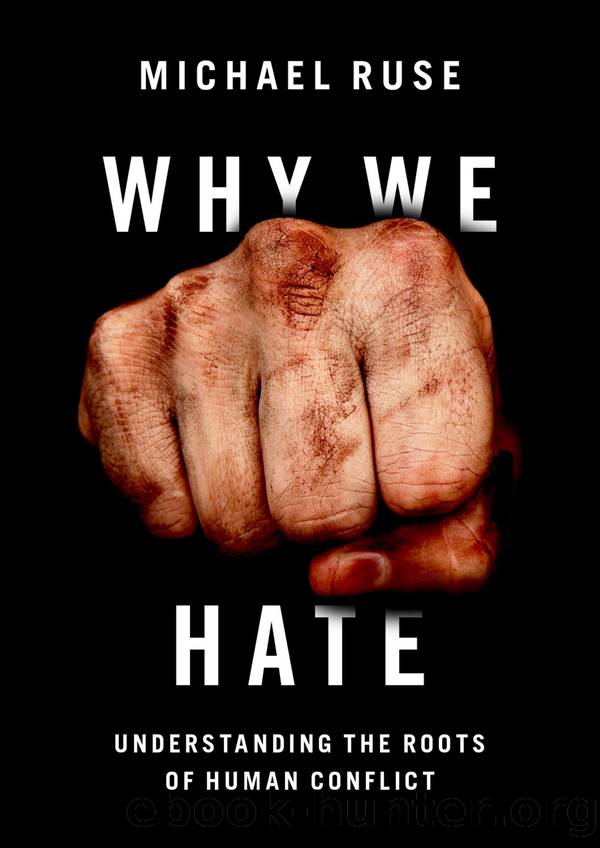Why We Hate by Michael Ruse

Author:Michael Ruse
Language: eng
Format: epub
Publisher: Oxford University Press
Published: 2022-06-15T00:00:00+00:00
At once, Ford has his answer: âIt is fundamental in the Catholic view that to take the life of an innocent person is always intrinsically wrong, that is, forbidden absolutely by natural law. Neither the state nor any private individual can thus dispose of the lives of the innocentâ (272). The young and the old, women, doctors, clergy, teachers, and many others. âIf you can believe that these classes of persons deserve to be described as combatants, or deserve to be treated as legitimate objects of violent repression, then I shall not argue further. If, when their governments declare war, these persons are so guilty that they deserve death, or almost any violence to person and property short of death, then let us forget the law of Christian charity, the natural law, and go back to barbarism, admitting that total war has won out and we must submit to itâ (283).
One suspects that not everyone will at once concede all Fordâs points. He includes women in the category of noncombatants, but apart from female members of the armed forces and the large numbers working in munitions factories, it is a little naïve to suggest that no women are aiding the war effort through the support of soldiers. Overall, though, the case is powerful, and is surely valid today (Grayling 2006). Few would now argue that it was morally right to bomb Dresden, virtually at the end of the war, destroying one of the gems of Europe and killing many people. Just War Theory did not stop the actions, but clearly and unequivocally it judged them wrong. Bishop George Bell of Chichester was one who, during the war, stood up and publicly criticized the bombing, regretfully showing that his fellow Anglican bishops had learned nothing from the previous war (Jasper 1967). The Archbishop of York declared that âit is a lesser evil to bomb the war-loving Germans than to sacrifice the lives of our fellow countrymenâ (Maynard 1996, 198). It is thought that Bellâs stance so alienated Prime Minister Churchill that, two years later, Bell was denied the Archbishopric of Canterbury. The irony of this whole discussion is that postwar analyses almost universally agreed that, in Europe, obliteration bombing was a failure. It failed to break the spirit of the Germans, and industrial production went on increasing during the war.
Did Just War Theory have any bite? Take up the issue of prisoners. If you look at the bare statistics, in both world wars many Germans were taken prisoner. The raw statistics, however, are a little misleading. The vast bulk of German prisoners of war in the First World War came right at the end, as the whole military operation collapsed (Ferguson 2004, 156). In the Second World War, the figures are even more distorting, because most of the prisoners came after the war was finished (164)! If you go back to the earlier phases of the wars, there are differences. The First World War was a Holy War. Kill all Germans. These were the explicit directions.
Download
This site does not store any files on its server. We only index and link to content provided by other sites. Please contact the content providers to delete copyright contents if any and email us, we'll remove relevant links or contents immediately.
The remains of the day by Kazuo Ishiguro(8956)
Tools of Titans by Timothy Ferriss(8354)
Giovanni's Room by James Baldwin(7307)
The Black Swan by Nassim Nicholas Taleb(7092)
Inner Engineering: A Yogi's Guide to Joy by Sadhguru(6779)
The Way of Zen by Alan W. Watts(6583)
Asking the Right Questions: A Guide to Critical Thinking by M. Neil Browne & Stuart M. Keeley(5745)
The Power of Now: A Guide to Spiritual Enlightenment by Eckhart Tolle(5735)
The Six Wives Of Henry VIII (WOMEN IN HISTORY) by Fraser Antonia(5490)
Astrophysics for People in a Hurry by Neil DeGrasse Tyson(5171)
Housekeeping by Marilynne Robinson(4428)
12 Rules for Life by Jordan B. Peterson(4293)
Double Down (Diary of a Wimpy Kid Book 11) by Jeff Kinney(4254)
The Ethical Slut by Janet W. Hardy(4235)
Skin in the Game by Nassim Nicholas Taleb(4228)
Ikigai by Héctor García & Francesc Miralles(4226)
The Art of Happiness by The Dalai Lama(4117)
Skin in the Game: Hidden Asymmetries in Daily Life by Nassim Nicholas Taleb(3983)
Walking by Henry David Thoreau(3941)
